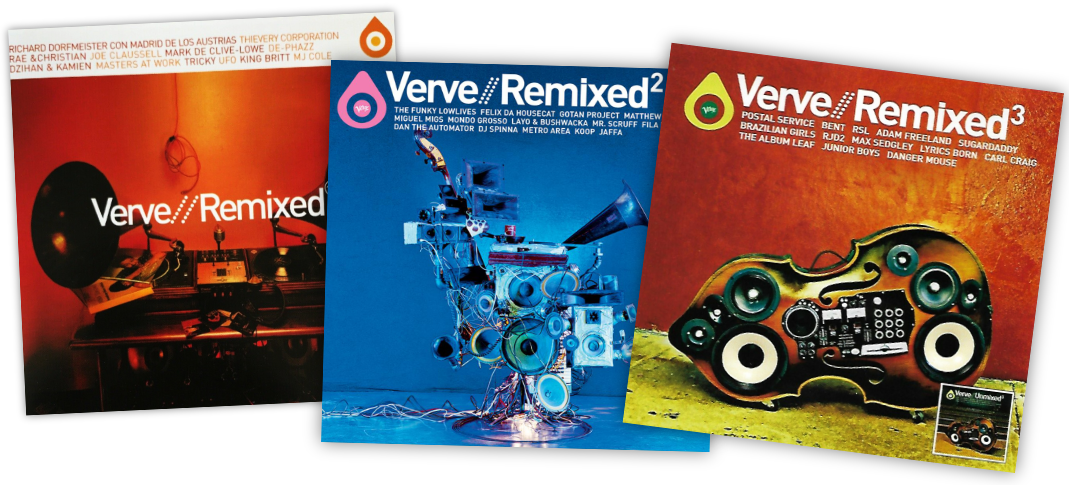Verve Remixed is a series of CDs, released beginning in 2008, by Verve Records that updated the label's classic jazz and jazz-vocal recordings by having some of the best DJs of the day remix them. It was a popular series that helped introduce many young people to some of the greatest jazz songs they otherwise may never have heard - and older, jazz-seasoned fans of the original recordings (me, for one) - seemed to like this series as much as the younger generation.
What's really cool about these three releases is that, in addition to the remixes, each volume has a companion disc titled Verve Unmixed, containing all of the original music as it was originally recorded. There are other discs in the series (I only have these three), and aside from being available individually they are also available as a boxed set, The Complete Verve Remixed Deluxe Box. The box also contains a bonus disc,Verve Remixed Plus. In addition, a Christmas music edition of the series was released in late 2008.
The appeal of this series has to do with how good the new remixes sound. Songs originally performed by such legends as Ella Fitzgerald, Sarah Vaughan, Nina Simone and Billie Holiday, among others, all get draped in electronic soundscapes that transform them into completely different - yet still recognizable - American songbook classics. And it's done so in a respectful way, too. This isn't a mutilation done to rush something "cool" to market. It's a labour of love by people who truly love the original music and were inspired enough by it to take it to another level entirely.
Tricky’s reworking of Billie Holiday’s Strange Fruit, from Volume One - well, it has to be heard. It's such an iconic song and it's a real departure presented like this, but Holiday's voice blends right in with the new treatment, sounding both ethereal and edgy. Horns, creeping rhythms and a bass line that lingers just behind, or sometimes out in front of, the beat make for a dramatic background to a song with such a serious subject as the lynching of African-Americans. Guitars stab in and out, as if poking the strange fruit hanging from the trees to make sure they're dead. It's haunting, knowing this, and it only lasts for just over three minutes, fading out long and slow.
Also on Volume One is MJ Cole's remix of Carmen McRae's How Long Has This Been Going On? It's a very subtle treatment that wraps around her voice and, particularly, the vocal hook. It's not as adventurous as some of the other remakes, but it's still a great reimagining. Piano twinkles here and there and the subtle bed of electronica underneath serves to drive home the simple question being asked, a question that heralds the end of a relationship. Or maybe a new beginning. How long has this been going on? Yet the music is almost happy, hopeful even. So maybe it was time. It's McRae's voice that stands out here - she'd still the star - and they haven't tinkered with it very much. It's almost perfect in its simplicity.
Nina Simone’s Feelin’ Good, at the hands of Joe Claussell, is a slice of laid back, slow groove R&B. I love this kind of thing. The smooth and steady intro is not at all rushed. It goes on for about two minutes, at which point I almost expect to hear Isaac Hayes lush baritone join in. I love the treatment Claussell gives this song. It’s delicious, a real joy to hear her sing backed like this. I prefer it to the original, I think, but I've always had a bit of a hard time digesting Nina on her own. This is how I think she should be heard. A very good interpretation.
The Genrtle Rain, from Astrud Gilberto, is beautifully remade by RDJ2, whatever or whoever that is. I don't know one DJ from the other, truth be told. But I have always loved Gilberto's voice. It's probably the sexiest voice in jazz, and here it's allowed to be front and centre over a funky bed that even has the sound of vinyl crackling along in the background. I don't know why that's such a big deal with the DJs, but they all seem to love doing it. Somewhat spare and with lots of room to breathe, this reworking brings Gilberto's vocal forward and lets it float above everything else like a cloud, including a repetitive keyboard two-stroke that bookends every 4/4 count, first up-then down, that really works well.
Adam Freeland's ultra cool remake of Sarah Vaughan's Fever makes me want to get up and dance - and I never want to get up and dance! It's just sooo good to listen to, and Vaughan's voice blends in with the new treatment perfectly, as though hearing it like this was the original intention. I can picture her up on stage dancing to the beat as she sings the words - and it seems normal! To be able to pull that off says something about Freeland's understanding of how one generation's sound can be updated with the times in a way that doesn't sound forced. Not an easy accomplishment.
There are a lot of stellar moments on these discs, and what makes them work so well is that the redos are re-constructions rather than re-mixings. That's important. Anybody can do a re-mix.
These songs are a real pleasure to listen to, and the fact that you can pull out a companion disc to hear the original inspiration behind this idea is a definite plus. These three discs are, collectively …
Verve Remixed is a series of CDs, released beginning in 2008, by Verve Records that updated the label's classic jazz and jazz-vocal recordings by having some of the best DJs of the day remix them. It was a popular series that helped introduce many young people to some of the greatest jazz songs they otherwise may never have heard - and older, jazz-seasoned fans of the original recordings (me, for one) - seemed to like this series as much as the younger generation.
What's really cool about these three releases is that, in addition to the remixes, each volume has a companion disc titled Verve Unmixed, containing all of the original music as it was originally recorded. There are other discs in the series (I only have these three), and aside from being available individually they are also available as a boxed set, The Complete Verve Remixed Deluxe Box. The box also contains a bonus disc,Verve Remixed Plus. In addition, a Christmas music edition of the series was released in late 2008.
The appeal of this series has to do with how good the new remixes sound. Songs originally performed by such legends as Ella Fitzgerald, Sarah Vaughan, Nina Simone and Billie Holiday, among others, all get draped in electronic soundscapes that transform them into completely different - yet still recognizable - American songbook classics. And it's done so in a respectful way, too. This isn't a mutilation done to rush something "cool" to market. It's a labour of love by people who truly love the original music and were inspired enough by it to take it to another level entirely.
Tricky’s reworking of Billie Holiday’s Strange Fruit, from Volume One - well, it has to be heard. It's such an iconic song and it's a real departure presented like this, but Holiday's voice blends right in with the new treatment, sounding both ethereal and edgy. Horns, creeping rhythms and a bass line that lingers just behind, or sometimes out in front of, the beat make for a dramatic background to a song with such a serious subject as the lynching of African-Americans. Guitars stab in and out, as if poking the strange fruit hanging from the trees to make sure they're dead. It's haunting, knowing this, and it only lasts for just over three minutes, fading out long and slow.
Also on Volume One is MJ Cole's remix of Carmen McRae's How Long Has This Been Going On? It's a very subtle treatment that wraps around her voice and, particularly, the vocal hook. It's not as adventurous as some of the other remakes, but it's still a great reimagining. Piano twinkles here and there and the subtle bed of electronica underneath serves to drive home the simple question being asked, a question that heralds the end of a relationship. Or maybe a new beginning. How long has this been going on? Yet the music is almost happy, hopeful even. So maybe it was time. It's McRae's voice that stands out here - she'd still the star - and they haven't tinkered with it very much. It's almost perfect in its simplicity.
Nina Simone’s Feelin’ Good, at the hands of Joe Claussell, is a slice of laid back, slow groove R&B. I love this kind of thing. The smooth and steady intro is not at all rushed. It goes on for about two minutes, at which point I almost expect to hear Isaac Hayes lush baritone join in. I love the treatment Claussell gives this song. It’s delicious, a real joy to hear her sing backed like this. I prefer it to the original, I think, but I've always had a bit of a hard time digesting Nina on her own. This is how I think she should be heard. A very good interpretation.
The Genrtle Rain, from Astrud Gilberto, is beautifully remade by RDJ2, whatever or whoever that is. I don't know one DJ from the other, truth be told. But I have always loved Gilberto's voice. It's probably the sexiest voice in jazz, and here it's allowed to be front and centre over a funky bed that even has the sound of vinyl crackling along in the background. I don't know why that's such a big deal with the DJs, but they all seem to love doing it. Somewhat spare and with lots of room to breathe, this reworking brings Gilberto's vocal forward and lets it float above everything else like a cloud, including a repetitive keyboard two-stroke that bookends every 4/4 count, first up-then down, that really works well.
Adam Freeland's ultra cool remake of Sarah Vaughan's Fever makes me want to get up and dance - and I never want to get up and dance! It's just sooo good to listen to, and Vaughan's voice blends in with the new treatment perfectly, as though hearing it like this was the original intention. I can picture her up on stage dancing to the beat as she sings the words - and it seems normal! To be able to pull that off says something about Freeland's understanding of how one generation's sound can be updated with the times in a way that doesn't sound forced. Not an easy accomplishment.
There are a lot of stellar moments on these discs, and what makes them work so well is that the redos are re-constructions rather than re-mixings. That's important. Anybody can do a re-mix.
These songs are a real pleasure to listen to, and the fact that you can pull out a companion disc to hear the original inspiration behind this idea is a definite plus. These three discs are, collectively …


